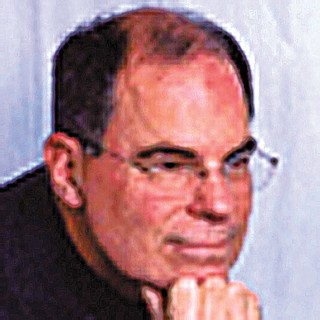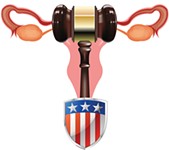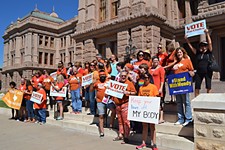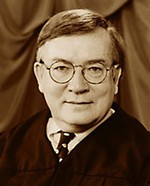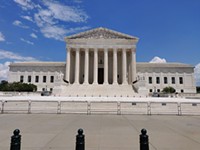Meet the Anti-Abortion 'Wordsmith' Defending HB 2
Did a state consultant act unethically during this month's HB 2 trial?
By Mary Tuma, Fri., Aug. 22, 2014
During the recent trial challenging parts of the Texas abortion law – House Bill 2 – witnesses for the state consistently denied receiving help drafting their testimony defending the legislation expected to shut down all but a handful of clinics. And one by one, plaintiffs' attorneys (representing abortion providers) "refreshed" their memories – with email correspondence that revealed the fingerprints of one highly influential man – Vincent Rue. As a hired consultant for the Attorney General's office, Rue assisted defendant testimony in the HB 2 case. It remains unclear whether he merely lent a helping hand, or worked unethically to direct testimony.
At least four state witnesses received editorial coaching from Rue – "wordsmithing," as one witness put it. For example, Rue suggested a witness omit data on abortion that contradicted the state's argument; provided research from a national anti-abortion group; and suggested several revisions to drafted witness reports that even troubled the witnesses. In one revealing email exchange, a witness became increasingly frustrated with Rue for injecting information she had not even read: "I see that 'my' report that you returned to me yesterday references my review of an expert report from Dr. Layne-Farrar [a plaintiff witness]," wrote medical facilities consultant Deborah Kitz, according to emails obtained by the Chronicle. "I have not ever seen such a report. To what does that refer? ... [P]lease do not attach my signature to any report until I sign off on it," she wrote. (For the record, every witness insisted on the stand that Rue did not influence his or her opinion.)
Who is the man behind the curtain? Rue is no reproductive health expert, nor a physician, nor impartial adviser. The marriage therapist holds a doctorate in family relations from the School of Home Economics at the University of North Carolina, and led the now-defunct Florida-based Institute for Pregnancy Loss. Rue is also a longtime and extreme anti-abortion advocate; he reportedly opposes abortions even in cases of rape or incest.
He's best known for coining the term "post-abortion stress syndrome" – an alleged mental disorder, unrecognized by either the American Psychological Association or the American Psychiatric Association, nevertheless endorsed by anti-choice activists and cited by legislators in defense of anti-abortion laws. (Even the Reagan-nominated and anti-abortion U.S. Surgeon General C. Everett Koop couldn't accept Rue's theory, rejecting a white paper on the supposed "syndrome" in 1989.)
Courts of law have consistently discredited Rue. In the historic Planned Parenthood v. Casey case, the presiding federal judge described Rue's testimony as "devoid of ... analytical force and scientific rigor," and wrote that "his admitted personal opposition to abortion ... suggests a possible personal bias." In a similar Minnesota case, the district judge concluded that Rue "possesses neither the academic qualifications nor the professional experience of plaintiffs' expert witnesses," and that his testimony "lacked ... analytical force." Most recently, an Alabama court discredited the testimony of one of Rue's go-to witnesses, Dr. John Anderson, "due to concerns about his judgment or honesty."Anderson also testified in support of HB 2.
Despite his clear ideological leanings and lack of medical expertise, states continue to employ Rue as a paid consultant to help defend abortion restrictions. According to Mother Jones, four Republican-led states (Texas, Wisconsin, Alabama, and North Dakota) have shelled out nearly $200,000 to Rue for his help defending stringent anti-abortion laws. In Texas, the Attorney General paid Rue more than $42,000 for his work, according to Texas Comptroller of Public Accounts records. Rue (who did not appear during the trial) did not respond to calls or emails requesting comment.
Considering his widely discredited research and dubious credibility, it's highly questionable that the state would not only seek out but also compensate Rue for his help defending a law supported by so little medical evidence. Nevertheless, the state's lawyers provide enthusiastic reviews of Rue's participation. "Given the extremely short time frame in which the state had to prepare for an expert-heavy trial in this case, Rue's familiarity with the available experts and his knowledge of the issues were a valuable resource for the state," said Lauren Bean with the A.G.'s office.
While it's troubling that the state would rely on an inherently biased "expert" to coach witness testimony, the greater problem may fall with the A.G. for having attempted to hide that coaching from the court. "It's not unusual to have witnesses rely on experts to prepare basic research in forming testimony – there's generally no prohibition on that," said Austin attorney Russ Horton. "However, the ethical problem arises from relying on someone's work product or allowing someone to shadow-draft your report, and concealing it from the court." (Indeed, under federal Rule of Civil Procedure 26, a "complete statement of all opinions the witness will express and the basis and reasons for them [and] the facts or data considered by the witness in forming them" must be provided.)
Failure to abide by that rule is precisely what plaintiffs are now charging. Following closing arguments in the roughly five-day case, the Center for Reproductive Rights filed a "failure to comply" notice, claiming defendants did not produce all required communications between Rue and testifying experts, including emails to Rue from the witnesses. In short, plaintiffs claim, the state attempted to hide, at least in part, Rue's trail.
"The idea behind [the ethical and procedural rules] is that if it's done openly, that witness can then be challenged on their report before the judge or the jury, who can choose to disregard it because he didn't write it or feel that he's unreliable," said Horton. "As long as all parties know what's going on and there is no concealment, everybody can weigh in on if a witness is particularly believable or not."
Concerning that apparent concealment, U.S. District Judge Lee Yeakel slapped the state on the wrist during the final day of trial. The state "effectively tried to hide Rue's involvement" said Yeakel, calling the obfuscation of evidence "very disturbing." Horton says Yeakel has wide latitude in how he may act to reprimand the state, including sanctioning or fining attorneys. Typically, the censure comes in the form of striking tainted testimony or disregarding it as unreliable.
In his ruling, expected before Sept. 1 – the day the final provision of HB 2 is scheduled to take effect – Yeakel will ultimately decide the value, or lack thereof, of Rue's influence.
Got something to say on the subject? Send a letter to the editor.
Read more of the Chronicle's decades of reproductive rights reporting here.





